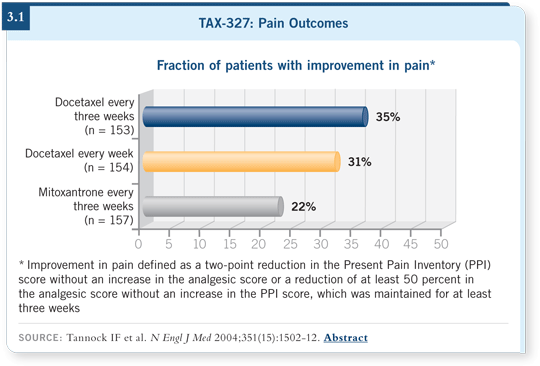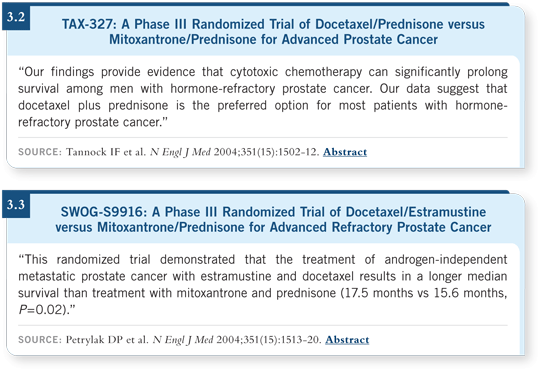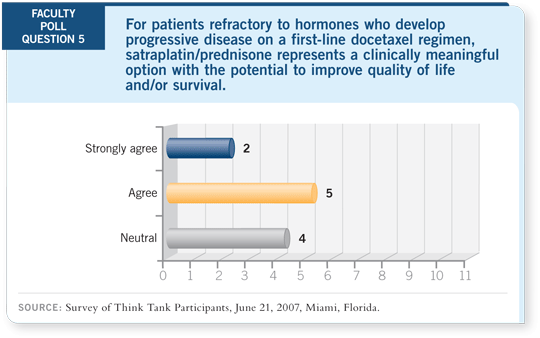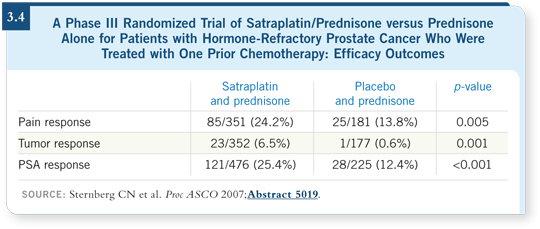

Select Excerpts from the Discussion
Track 36
 DR LOVE: Dan, what would you say to a patient with symptomatic
prostate cancer about the potential impact of chemotherapy on his
symptoms?
DR LOVE: Dan, what would you say to a patient with symptomatic
prostate cancer about the potential impact of chemotherapy on his
symptoms?
 DR PETRYLAK: Data from TAX-327 demonstrated significant improvement in
bone pain (3.1) and quality-of-life parameters (2.2) in favor of those symptomatic
patients who received docetaxel compared to those who received mitoxantrone
(Tannock 2004). I’ve seen symptomatic improvement in patients almost
immediately — within a week or two of starting treatment. It’s a fairly rapid
response.
DR PETRYLAK: Data from TAX-327 demonstrated significant improvement in
bone pain (3.1) and quality-of-life parameters (2.2) in favor of those symptomatic
patients who received docetaxel compared to those who received mitoxantrone
(Tannock 2004). I’ve seen symptomatic improvement in patients almost
immediately — within a week or two of starting treatment. It’s a fairly rapid
response.
 DR LOVE: Mike, what do you see when your patients come back from the
oncologist after receiving chemotherapy?
DR LOVE: Mike, what do you see when your patients come back from the
oncologist after receiving chemotherapy?

 DR ZELEFSKY: I would say that, in general, they do feel better in terms of
pain. They also are psychologically happier when they see that their PSAs are
dropping.
DR ZELEFSKY: I would say that, in general, they do feel better in terms of
pain. They also are psychologically happier when they see that their PSAs are
dropping.
 DR OH: I believe at least half of the symptomatic patients have a significant
palliative benefit from chemotherapy — we’re also extending their survival
(3.2, 3.3). As Dr Zelefsky was pointing out, they want to know that their
tumors are under control, which probably improves their quality of life above
and beyond the pain benefit.
DR OH: I believe at least half of the symptomatic patients have a significant
palliative benefit from chemotherapy — we’re also extending their survival
(3.2, 3.3). As Dr Zelefsky was pointing out, they want to know that their
tumors are under control, which probably improves their quality of life above
and beyond the pain benefit.
 DR LOVE: Steve, for a patient with asymptomatic metastatic prostate cancer,
how would you compare the ability to delay the onset of symptomatic disease
and extend survival to the side effects and quality-of-life issues?
DR LOVE: Steve, for a patient with asymptomatic metastatic prostate cancer,
how would you compare the ability to delay the onset of symptomatic disease
and extend survival to the side effects and quality-of-life issues?
 DR FREEDLAND: Patients don’t walk in the door with metastatic hormone-refractory
disease. They made a lot of choices along the way before they got
there. It usually starts out with the choice to be screened for PSA, and they
chose to be aggressive. They chose when it was positive to have the biopsy.
They chose to undergo treatment — surgery or radiation. They chose to have
the hormones before they had metastatic disease. So the patient often has
chosen at every step of the game to be aggressive, based upon a PSA blood
test. Now that we have a hormone-refractory rising PSA, I don’t see why that
mantra would be any different.
DR FREEDLAND: Patients don’t walk in the door with metastatic hormone-refractory
disease. They made a lot of choices along the way before they got
there. It usually starts out with the choice to be screened for PSA, and they
chose to be aggressive. They chose when it was positive to have the biopsy.
They chose to undergo treatment — surgery or radiation. They chose to have
the hormones before they had metastatic disease. So the patient often has
chosen at every step of the game to be aggressive, based upon a PSA blood
test. Now that we have a hormone-refractory rising PSA, I don’t see why that
mantra would be any different.
 DR TAPLIN: I believe the asymptomatic patient with hormone-refractory
prostate cancer is analogous to the patient with a rising PSA in that we have some predictors. Some of these patients have a slowly rising PSA, and you
might hold back on chemotherapy in those patients and obtain intermittent
scans. It could be a couple of years before they develop metastases. Other
patients may have a rapidly rising PSA. They have had other predictors prior
to this point that were negative, such as a short response to primary hormone
therapy or no response to second-line hormone therapy. You know those
patients are going downhill in a short time.
DR TAPLIN: I believe the asymptomatic patient with hormone-refractory
prostate cancer is analogous to the patient with a rising PSA in that we have some predictors. Some of these patients have a slowly rising PSA, and you
might hold back on chemotherapy in those patients and obtain intermittent
scans. It could be a couple of years before they develop metastases. Other
patients may have a rapidly rising PSA. They have had other predictors prior
to this point that were negative, such as a short response to primary hormone
therapy or no response to second-line hormone therapy. You know those
patients are going downhill in a short time.

Track 42
 DR LOVE: Dan, can you discuss the safety and efficacy profile of satraplatin?
DR LOVE: Dan, can you discuss the safety and efficacy profile of satraplatin?
 DR PETRYLAK: The side-effect profile for satraplatin is remarkably benign.
Our patient who was on it the longest received 14 cycles of treatment. He
did extremely well while he was on the study. Moderate fatigue and minimal
nausea occur with satraplatin. As the duration of therapy increases, more
hematologic toxicity is observed, but it’s a well-tolerated treatment.
DR PETRYLAK: The side-effect profile for satraplatin is remarkably benign.
Our patient who was on it the longest received 14 cycles of treatment. He
did extremely well while he was on the study. Moderate fatigue and minimal
nausea occur with satraplatin. As the duration of therapy increases, more
hematologic toxicity is observed, but it’s a well-tolerated treatment.
Satraplatin has clear-cut clinical activity as evidenced from the pain data, PSA
data and the objective response rate (Sternberg 2007; [3.4]). We are seeing a
population of patients, as we saw with docetaxel, who will respond for a long
time.
 DR LOVE: Dan, if satraplatin was available today, how would you use it?
DR LOVE: Dan, if satraplatin was available today, how would you use it?
 DR PETRYLAK: I would use satraplatin exactly as we did in the trial
(Sternberg 2007), in patients who failed prior docetaxel.
DR PETRYLAK: I would use satraplatin exactly as we did in the trial
(Sternberg 2007), in patients who failed prior docetaxel.

 DR OH: In patients who were previously treated with docetaxel, the difference
in median progression-free survival was one week for satraplatin versus placebo
(Sternberg 2007). One might ask, what’s the point? However, it is important to
go beyond the median because there is a platinum-sensitive subset of patients.
DR OH: In patients who were previously treated with docetaxel, the difference
in median progression-free survival was one week for satraplatin versus placebo
(Sternberg 2007). One might ask, what’s the point? However, it is important to
go beyond the median because there is a platinum-sensitive subset of patients.
Data with other platinum drugs clearly demonstrate that some patients respond
well to platinum-based agents. This large randomized trial demonstrates that
exact fact. The problem is if you look at the median, you lose what might be a
dramatic benefit in about a third of the patients (Sternberg 2007).
Tracks 44-45
 DR LOVE: Steve, if a patient is symptomatic after progressing on
hormones and then on docetaxel, what’s the likelihood he will feel better
after receiving satraplatin?
DR LOVE: Steve, if a patient is symptomatic after progressing on
hormones and then on docetaxel, what’s the likelihood he will feel better
after receiving satraplatin?
 DR PETRYLAK: A clear-cut difference in pain response exists between satraplatin
and placebo — 24 percent versus 14 percent (Sternberg 2007; [3.4]). So
there’s a fairly good chance this patient will feel better.
DR PETRYLAK: A clear-cut difference in pain response exists between satraplatin
and placebo — 24 percent versus 14 percent (Sternberg 2007; [3.4]). So
there’s a fairly good chance this patient will feel better.
 DR OH: I believe satraplatin might open the door to physicians who would
otherwise feel that their patients are not candidates for chemotherapy. It may,
therefore, open the door to using docetaxel subsequently.
DR OH: I believe satraplatin might open the door to physicians who would
otherwise feel that their patients are not candidates for chemotherapy. It may,
therefore, open the door to using docetaxel subsequently.
Biologically, there’s no reason to believe that docetaxel and satraplatin should
be cross reactive in terms of sensitivity. We don’t know yet because satraplatin
hasn’t been evaluated in the first-line setting.
Select Publications

